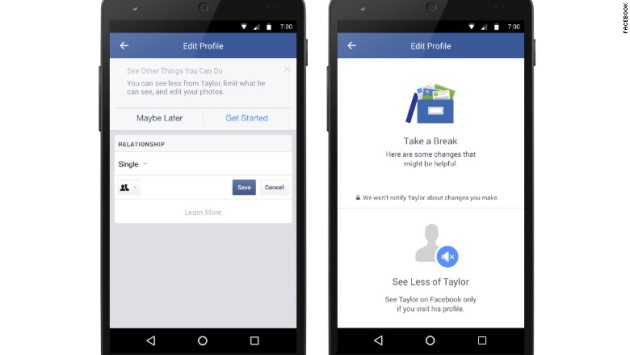Facebook can now hide your exes
 November 20: You just broke up with your girlfriend of a year. You’ve spent the last three days sulking on your sofa, too devastated to shower or eat anything but string cheese. You idly open Facebook between Netflix binges and see your ex has posted a smiling photo of a night out on the town.
November 20: You just broke up with your girlfriend of a year. You’ve spent the last three days sulking on your sofa, too devastated to shower or eat anything but string cheese. You idly open Facebook between Netflix binges and see your ex has posted a smiling photo of a night out on the town.
Breakups in the time of social media updates can be rough. Facebook is testing a new feature that will help ease the pain, without forcing you to unfriend exes or delete all your past posts.
The new “Take a Break” option pops up when you make the breakup Facebook official. After you change a relationship status, you’ll be given the option to limit what you see about your ex and what they can see about you.
If you opt to “see less” of your former flame, their updates will no longer appear in the news feed and you won’t get reminders from Facebook (FB, Tech30) to tag him or her in a photo. (But don’t worry, you’ll still be able to visit the profile page while listening to Adele on repeat.)
The settings go both ways. You can also hide your own updates. With this option, your ex only sees new posts he or she is tagged in, or things posted publicly or shared with mutual friends.
As Facebook has awkwardly discovered with its own memories features, sometimes the past is really painful. An edit option will let you go through all your old posts and block an ex from seeing them, or untag yourself from those smooching selfies you took in better times.
“This work is part of our ongoing effort to develop resources for people who may be going through difficult moments in their lives,” said Facebook in a blog post.
In the olden days, you might have burned a box of photos. That’s harder to do when photos are digital.
This may not be as therapeutic, but it does have one big advantage: none of the Facebook changes are permanent. You can undo them at any time, which is great if you get back together, become friends or get nostalgic.
Former flames won’t be notified of your changes. The feature is being tested in the U.S. to start, but should eventually roll out to broken hearts around the world.
